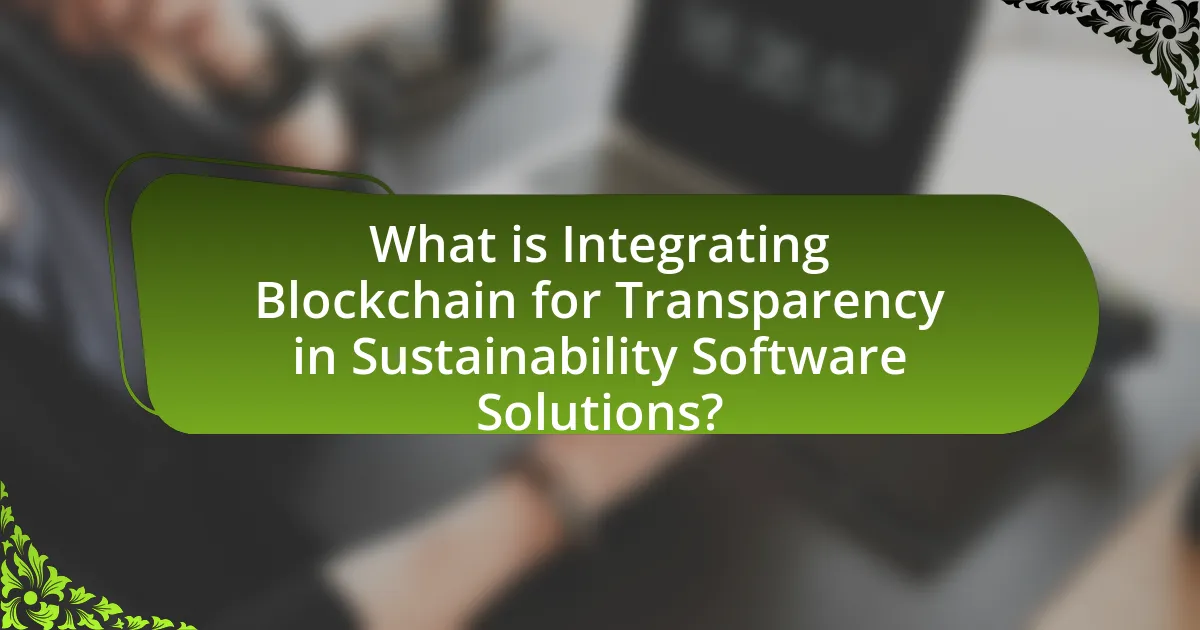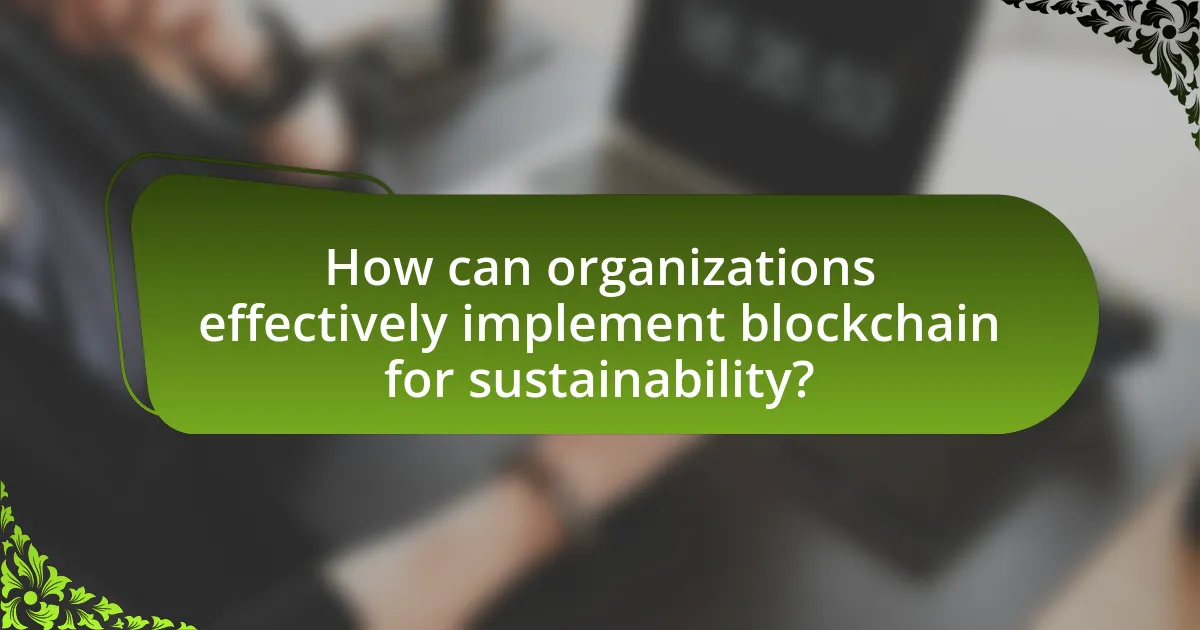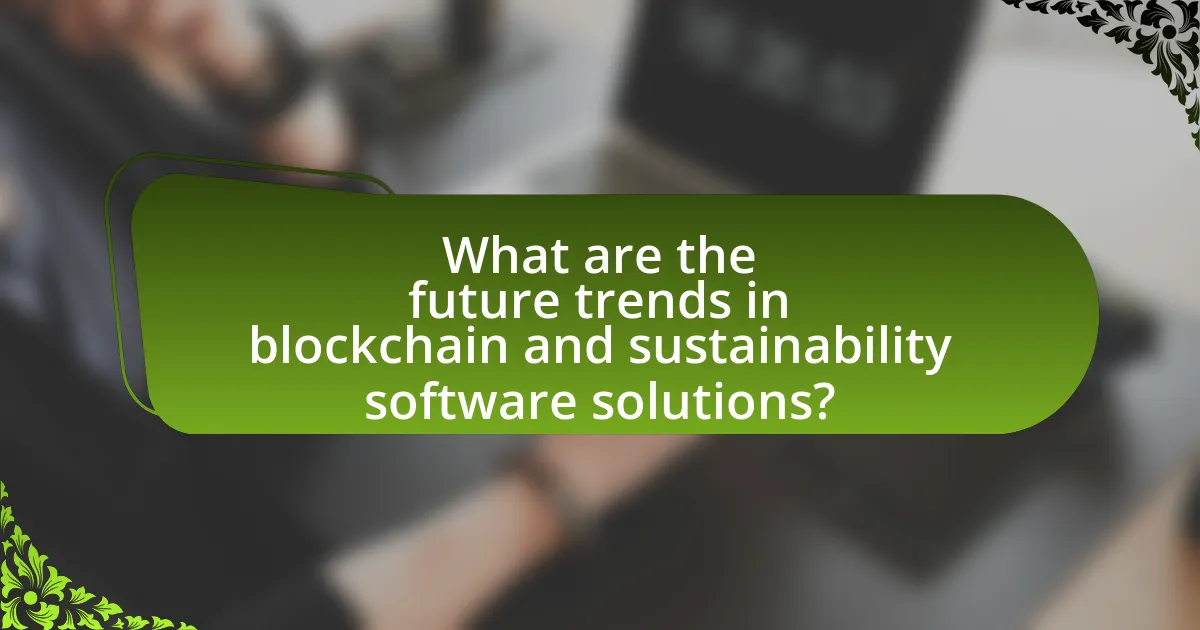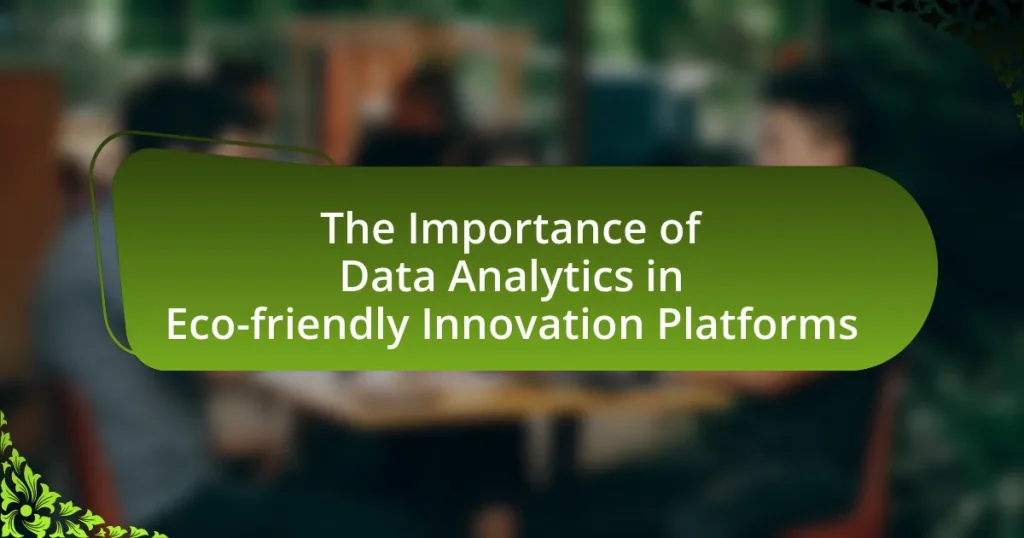Integrating blockchain technology into sustainability software solutions enhances transparency, traceability, and accountability in sustainable practices. This article explores how blockchain’s immutable and decentralized ledger improves the verification of sustainability claims, tracks product lifecycles, and ensures compliance with environmental standards. Key features such as data immutability, real-time access, and decentralized control foster trust among stakeholders, while challenges like scalability and interoperability must be addressed for effective implementation. The article also discusses the implications of transparency for stakeholder engagement, regulatory compliance, and sustainability reporting, along with practical steps organizations can take to successfully integrate blockchain into their sustainability initiatives.

What is Integrating Blockchain for Transparency in Sustainability Software Solutions?
Integrating blockchain for transparency in sustainability software solutions involves utilizing blockchain technology to enhance the traceability and accountability of sustainable practices within software applications. This integration allows stakeholders to verify the authenticity of sustainability claims, track the lifecycle of products, and ensure compliance with environmental standards. For instance, a study by Accenture found that 83% of executives believe blockchain can improve supply chain transparency, thereby fostering trust among consumers and businesses. By providing an immutable ledger of transactions, blockchain ensures that data related to sustainability efforts is secure, transparent, and easily accessible, ultimately promoting responsible consumption and production.
How does blockchain technology enhance transparency in sustainability software?
Blockchain technology enhances transparency in sustainability software by providing an immutable and decentralized ledger that records all transactions and data exchanges. This feature ensures that all stakeholders can access the same information in real-time, reducing the risk of data manipulation or fraud. For instance, a study by the World Economic Forum highlights that blockchain can track the entire supply chain of sustainable products, allowing consumers to verify claims about sourcing and environmental impact. This level of traceability fosters trust among users and stakeholders, as they can independently verify the authenticity of sustainability claims without relying on a single entity.
What are the key features of blockchain that support transparency?
The key features of blockchain that support transparency include immutability, decentralization, and real-time data access. Immutability ensures that once data is recorded on the blockchain, it cannot be altered or deleted, providing a permanent and verifiable record of transactions. Decentralization distributes control across a network of nodes, eliminating single points of failure and allowing all participants to access the same information, which enhances trust. Real-time data access enables stakeholders to view transactions as they occur, fostering accountability and reducing information asymmetry. These features collectively create a transparent environment where all actions can be audited and verified by any participant in the network.
How does data immutability contribute to trust in sustainability solutions?
Data immutability enhances trust in sustainability solutions by ensuring that once data is recorded, it cannot be altered or deleted, thus providing a reliable and verifiable record of actions and transactions. This characteristic is crucial in sustainability initiatives, where stakeholders need assurance that reported data, such as carbon emissions or resource usage, is accurate and unchangeable. For instance, blockchain technology, which utilizes data immutability, has been employed in various sustainability projects to track supply chains, ensuring that claims about sustainable practices are backed by tamper-proof evidence. This transparency fosters accountability among participants, as any discrepancies can be easily identified and traced back to their source, reinforcing trust in the overall sustainability efforts.
Why is transparency important in sustainability software solutions?
Transparency is crucial in sustainability software solutions because it fosters trust among stakeholders and ensures accountability in environmental practices. When sustainability software provides clear and accessible data regarding resource usage, emissions, and compliance, it enables organizations to make informed decisions and enhances their credibility. For instance, a study by the World Economic Forum highlights that transparency in supply chains can reduce carbon emissions by up to 30%, demonstrating the tangible benefits of clear data sharing. Thus, transparency not only supports ethical practices but also drives measurable improvements in sustainability outcomes.
What role does transparency play in stakeholder engagement?
Transparency is crucial in stakeholder engagement as it fosters trust and accountability among all parties involved. When stakeholders have access to clear and accurate information, they are more likely to participate actively and contribute to decision-making processes. Research indicates that organizations that prioritize transparency experience higher levels of stakeholder satisfaction and loyalty, as evidenced by a 2021 study published in the Journal of Business Ethics, which found that transparent communication significantly enhances stakeholder relationships and engagement outcomes.
How does transparency impact regulatory compliance in sustainability?
Transparency significantly enhances regulatory compliance in sustainability by providing clear, accessible information about environmental practices and impacts. When organizations adopt transparent practices, they facilitate easier monitoring and verification of compliance with sustainability regulations. For instance, companies that disclose their carbon emissions data and sustainability efforts can be more readily assessed against regulatory standards, reducing the risk of non-compliance. Research indicates that organizations with high transparency levels often experience fewer regulatory penalties, as they demonstrate accountability and commitment to sustainable practices. This correlation is supported by a study from the Global Reporting Initiative, which found that companies with robust sustainability reporting frameworks are better positioned to meet regulatory requirements and stakeholder expectations.
What challenges exist in integrating blockchain into sustainability software?
Integrating blockchain into sustainability software faces several challenges, including scalability, interoperability, and regulatory compliance. Scalability issues arise because blockchain networks can struggle to handle a high volume of transactions efficiently, which is crucial for sustainability applications that may require real-time data processing. Interoperability challenges occur when different blockchain systems or existing software solutions cannot communicate effectively, hindering data sharing and collaboration across platforms. Regulatory compliance is another significant challenge, as varying legal frameworks across regions can complicate the implementation of blockchain technology in sustainability initiatives. These challenges must be addressed to fully leverage blockchain’s potential for enhancing transparency and accountability in sustainability efforts.
What are the technical barriers to blockchain integration?
The technical barriers to blockchain integration include scalability, interoperability, and security concerns. Scalability issues arise because many blockchain networks struggle to handle a high volume of transactions efficiently; for instance, Bitcoin processes about seven transactions per second, which is significantly lower than traditional payment systems like Visa, which can handle thousands. Interoperability challenges occur as different blockchain platforms often lack the ability to communicate with one another, hindering seamless data exchange. Security concerns also persist, particularly regarding vulnerabilities in smart contracts and the potential for 51% attacks, where a single entity gains control over the majority of the network’s mining power, compromising the integrity of the blockchain. These barriers collectively impede the widespread adoption of blockchain technology in various applications, including sustainability software solutions.
How can organizations overcome resistance to adopting blockchain technology?
Organizations can overcome resistance to adopting blockchain technology by implementing comprehensive education and training programs that highlight the benefits and functionalities of blockchain. These programs should focus on demonstrating real-world applications and success stories, such as how companies like IBM and Walmart have utilized blockchain for supply chain transparency, resulting in increased efficiency and reduced fraud. Additionally, organizations can foster a culture of innovation by involving stakeholders in the decision-making process, addressing concerns through open dialogue, and showcasing pilot projects that illustrate the technology’s potential. This approach not only builds trust but also encourages a collaborative environment that can facilitate smoother transitions to blockchain adoption.

How can organizations effectively implement blockchain for sustainability?
Organizations can effectively implement blockchain for sustainability by integrating it into their supply chain management systems to enhance transparency and traceability. This integration allows organizations to track the origin and journey of materials, ensuring that sustainable practices are followed throughout the supply chain. For instance, companies like IBM and Walmart have utilized blockchain to monitor food supply chains, which has resulted in reduced waste and improved food safety. By providing immutable records of transactions, blockchain technology fosters trust among stakeholders and encourages adherence to sustainability standards.
What steps should organizations take to integrate blockchain into their sustainability initiatives?
Organizations should take the following steps to integrate blockchain into their sustainability initiatives: first, they must identify specific sustainability goals that can benefit from blockchain technology, such as supply chain transparency or carbon footprint tracking. Next, organizations should assess their current data management systems to determine how blockchain can enhance data integrity and traceability. Following this, they need to collaborate with blockchain experts and technology providers to design a tailored solution that aligns with their sustainability objectives. Additionally, organizations should pilot the blockchain solution on a small scale to evaluate its effectiveness and scalability before full implementation. Finally, they must continuously monitor and evaluate the impact of blockchain on their sustainability initiatives, making adjustments as necessary to optimize performance. These steps are supported by the growing trend of companies leveraging blockchain for enhanced transparency and accountability in sustainability practices, as evidenced by case studies from industries such as agriculture and energy.
What are the best practices for selecting blockchain platforms?
The best practices for selecting blockchain platforms include assessing scalability, security, interoperability, and community support. Scalability ensures that the platform can handle increasing transaction volumes, which is crucial for sustainability applications that may experience growth. Security is vital to protect sensitive data and maintain trust; platforms should have robust consensus mechanisms and encryption standards. Interoperability allows different blockchain systems to communicate, which is essential for integrating various sustainability solutions. Community support indicates the availability of resources, updates, and a network of developers, which can enhance the platform’s longevity and adaptability. These criteria are supported by industry reports indicating that platforms like Ethereum and Hyperledger are favored for their strong ecosystems and proven track records in enterprise applications.
How can organizations ensure data quality and accuracy in blockchain systems?
Organizations can ensure data quality and accuracy in blockchain systems by implementing robust validation mechanisms and consensus protocols. These mechanisms, such as proof of work or proof of stake, require multiple nodes to verify transactions before they are added to the blockchain, thereby reducing the likelihood of erroneous or fraudulent data. Additionally, organizations can utilize smart contracts to automate data validation processes, ensuring that only accurate and verified information is recorded. Research indicates that blockchain’s decentralized nature inherently enhances data integrity, as it minimizes the risk of a single point of failure or manipulation.
What are the potential impacts of blockchain on sustainability reporting?
Blockchain can significantly enhance sustainability reporting by providing transparent, immutable records of data related to environmental and social governance. This technology enables organizations to track and verify their sustainability claims in real-time, ensuring accountability and reducing the risk of greenwashing. For instance, a study by Accenture found that 83% of executives believe blockchain can improve trust in sustainability reporting by ensuring data integrity and traceability. By utilizing smart contracts, companies can automate compliance with sustainability standards, further streamlining reporting processes. Thus, blockchain’s potential impacts on sustainability reporting include increased transparency, enhanced data accuracy, and improved stakeholder trust.
How can blockchain improve the accuracy of sustainability metrics?
Blockchain can improve the accuracy of sustainability metrics by providing a decentralized and immutable ledger for data recording. This technology ensures that all sustainability-related data, such as carbon emissions or resource usage, is transparently recorded and cannot be altered retroactively, thus enhancing data integrity. For instance, a study by the World Economic Forum highlights that blockchain can track supply chain emissions in real-time, allowing for precise measurement and reporting of sustainability metrics. By eliminating discrepancies and enabling real-time data verification, blockchain fosters trust among stakeholders and enhances the reliability of sustainability assessments.
What are the implications of real-time data sharing for sustainability reporting?
Real-time data sharing significantly enhances sustainability reporting by providing immediate access to accurate and up-to-date information. This immediacy allows organizations to track their environmental impact more effectively, enabling timely adjustments to practices that promote sustainability. For instance, companies can monitor resource consumption and emissions in real-time, leading to more informed decision-making and accountability. Research indicates that organizations utilizing real-time data sharing can improve their sustainability performance by up to 30%, as they can quickly identify inefficiencies and implement corrective measures. Furthermore, the integration of blockchain technology ensures data integrity and transparency, fostering trust among stakeholders and enhancing the credibility of sustainability reports.

What are the future trends in blockchain and sustainability software solutions?
Future trends in blockchain and sustainability software solutions include increased adoption of decentralized finance (DeFi) applications for sustainable investments, enhanced traceability in supply chains, and the integration of smart contracts for automating sustainability compliance. The rise of DeFi allows for transparent funding of green projects, as evidenced by the growth of green bonds issued on blockchain platforms, which reached over $300 billion in 2021. Enhanced traceability ensures that consumers can verify the sustainability claims of products, with companies like IBM using blockchain to track the origins of food products, thereby reducing fraud and increasing consumer trust. Additionally, smart contracts facilitate automatic enforcement of sustainability standards, as seen in projects like Energy Web, which uses blockchain to manage renewable energy certificates efficiently. These trends indicate a significant shift towards leveraging blockchain technology to promote transparency and accountability in sustainability efforts.
How is the adoption of blockchain expected to evolve in sustainability sectors?
The adoption of blockchain in sustainability sectors is expected to increase significantly as organizations seek enhanced transparency and traceability in their operations. This evolution is driven by the need for reliable data on supply chains, carbon footprints, and resource management, which blockchain technology can provide through immutable records and decentralized verification. For instance, a report by the World Economic Forum highlights that blockchain can improve supply chain transparency, enabling companies to track the origin of materials and ensure ethical sourcing. As regulatory pressures and consumer demand for sustainable practices grow, the integration of blockchain in sustainability initiatives is likely to become a standard practice, facilitating accountability and fostering trust among stakeholders.
What innovations in blockchain technology could enhance sustainability efforts?
Innovations in blockchain technology that could enhance sustainability efforts include decentralized energy trading platforms, supply chain transparency solutions, and carbon credit tracking systems. Decentralized energy trading platforms allow consumers to buy and sell renewable energy directly, reducing reliance on centralized power grids and promoting the use of clean energy sources. Supply chain transparency solutions utilize blockchain to provide real-time tracking of products, ensuring ethical sourcing and reducing waste by enabling more efficient logistics. Carbon credit tracking systems leverage blockchain to create immutable records of carbon credits, facilitating easier trading and verification of emissions reductions. These innovations collectively contribute to more sustainable practices by promoting transparency, efficiency, and accountability in various sectors.
How might regulatory changes influence blockchain integration in sustainability?
Regulatory changes can significantly influence blockchain integration in sustainability by establishing clear guidelines that promote its adoption and use. For instance, regulations that incentivize transparency and accountability in supply chains can encourage companies to implement blockchain technology to track and verify sustainable practices. A study by the World Economic Forum in 2020 highlighted that regulatory frameworks supporting digital technologies could enhance trust and collaboration among stakeholders, thereby facilitating the integration of blockchain in sustainability initiatives.
What practical tips can organizations follow for successful blockchain integration in sustainability?
Organizations can achieve successful blockchain integration in sustainability by focusing on collaboration, clear use cases, and robust governance structures. Collaboration among stakeholders, including suppliers, customers, and regulatory bodies, ensures that all parties are aligned on sustainability goals and data sharing. Establishing clear use cases helps organizations identify specific problems that blockchain can solve, such as tracking supply chain emissions or verifying sustainable sourcing. Implementing robust governance structures is essential to manage data integrity, privacy, and compliance with regulations, which enhances trust in the blockchain system. These strategies are supported by case studies showing that companies like Walmart and IBM have successfully utilized blockchain for supply chain transparency, leading to improved sustainability outcomes.
How can organizations build a culture of innovation to support blockchain initiatives?
Organizations can build a culture of innovation to support blockchain initiatives by fostering an environment that encourages experimentation and collaboration. This can be achieved through implementing cross-functional teams that bring together diverse skill sets, which enhances creative problem-solving. Additionally, providing continuous education and training on blockchain technology empowers employees to explore its potential applications. Research indicates that companies with a strong culture of innovation, such as Google and Amazon, see higher rates of successful project implementation and employee engagement. By prioritizing open communication and rewarding innovative ideas, organizations can effectively integrate blockchain into their sustainability software solutions.
What resources are available for organizations looking to learn more about blockchain in sustainability?
Organizations looking to learn more about blockchain in sustainability can access a variety of resources, including academic journals, industry reports, and online courses. For instance, the “Blockchain for Sustainable and Inclusive Finance” report by the World Bank provides insights into how blockchain can enhance sustainability efforts. Additionally, platforms like Coursera and edX offer courses specifically focused on blockchain applications in sustainability, enabling organizations to gain practical knowledge. Furthermore, organizations can refer to the “Sustainable Development Goals and Blockchain” paper published by the United Nations, which outlines the potential of blockchain technology in achieving sustainability goals. These resources collectively offer a comprehensive understanding of the intersection between blockchain technology and sustainability initiatives.



